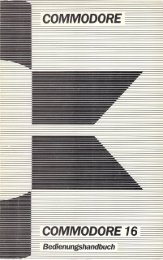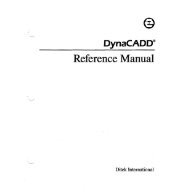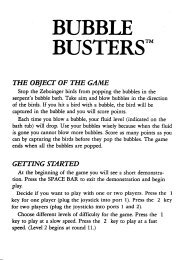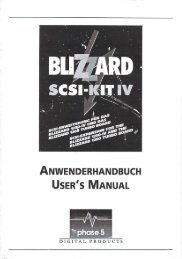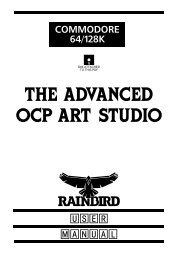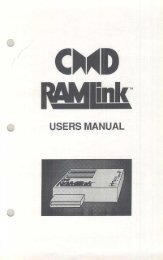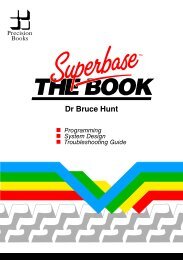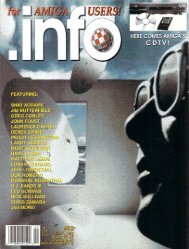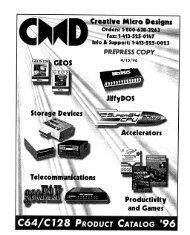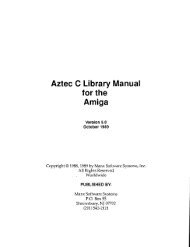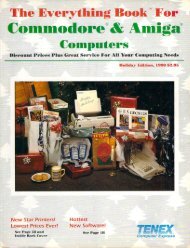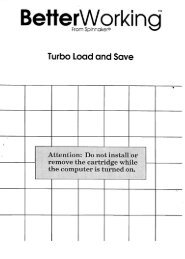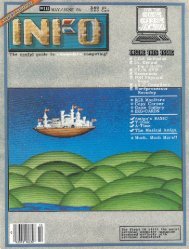Create successful ePaper yourself
Turn your PDF publications into a flip-book with our unique Google optimized e-Paper software.
<strong>TELECOMPUTING</strong> continued...<br />
The real action, however, takes place latenight on an<br />
information service (a commercial network). Join one<br />
and you'll never have to be alone again: hundreds of<br />
personal computers - from anywhere in the world - can<br />
be hosted at the same time by these mainframes. But<br />
watch out: it's easy to get hooked and can quickly<br />
became expensive; I have the bills to prove it.<br />
There's a fee to join and you're charged for the time<br />
you're "on-line" or actually connected to the<br />
network. You don't incur long distance telephone<br />
charges to reach a network if you live in a<br />
fair-sized city since a local access number (Telenet<br />
or Tymnet) connects you directly to the mainframe.<br />
amtl Ctaritn* S.Jeanit c *<br />
i Peggy,<br />
Do you want Me to send you Mail that<br />
;ou could take a picture of?<br />
Love.<br />
£ Pi £<br />
Ind of Hessage - Press F5 to cancel<br />
Jill Pi<br />
Indy D<br />
>eggy H<br />
)aniel 0<br />
Feanie C<br />
>aniel Q<br />
All r ight Randy''' !<br />
youi ; > gned up1<br />
Redlly, I'm gonna take a<br />
screen shot for the INFO 64<br />
article. OK?<br />
sure<br />
why not?<br />
hMMMHM<br />
ELECTRONIC RAPPIH' TRANSCENDS<br />
A6E, SEX, £ RACE BARRIERS.<br />
ARE YOUR ONLY LIMITATIONS.<br />
YOUR 5Y5TEF1 CONFIGURATION<br />
Along with a computer and monitor or TV, you'll<br />
probably want a disk drive; tape is severely<br />
limiting. Besides a modem (which we'll get to in a<br />
moment) you must have a modular telephone with a hand<br />
set that unplugs from the dialing mechanism: an old<br />
desk model.<br />
A modem is an R5-232C device which PDOulates computer<br />
digital bit streams into audible pulses (that<br />
telephone lines can carry) and DEPbdulates pulses<br />
when they're received. There are three types for the<br />
'64: 1) a manual modem like the 1600 Uicmodem<br />
requires that you dial the number and plug the line<br />
from the phone base into the modem; 2) the<br />
programmable or automatic type like the 1650 l/icmodem<br />
that dial for you (some programs make the modem<br />
redial periodically on a busy signal, or answer<br />
incoming calls); and 3) the intelligent or "smart"<br />
kind which house ROM chips and do everything an auto<br />
modem can and then some.<br />
The modem determines the speed at which data are<br />
transmitted, measured in bits per second or Baud<br />
rate, the standard today being 300 bps. Transmitting<br />
data faster can reduce your connect time (although<br />
commercial networks know it and charge more for<br />
transmissions over 300 bps). Dnly a smart modem can<br />
handle mare than 300 bps on the '64. Carnnodare<br />
announced a 1200 bps modem for the C-128 in January<br />
but it won't work with the '64.<br />
Buy a modem before joining a commercial network; free<br />
time and/or discounts sometimes come with them. If<br />
you already have a modem, consider a network "starter<br />
kit."<br />
PROTOCOLS<br />
Terminal software determines what you can - or can't<br />
- do on-line. It shuts out BASIC and makes your<br />
computer emulate a terminal. Using it is like using<br />
a word processor except for the fact that there's a<br />
telephone line within the system. Stray noises on<br />
the phone line will corrupt data in transit. This<br />
isn't important when you're "talking" with another<br />
computer user who can overlook an error here or there<br />
but conversation isn't the only thing sent over phone<br />
lines. Programs can get messed up and, as you<br />
probably know all too well, one error is all it<br />
takes.<br />
Several ways of making sure precisely what was sent<br />
got there, called "error checking protocols," are in<br />
use and each method was designed for a particular<br />
host computer. The error checking protocol in the<br />
program running on your ' 64 must match that used by<br />
the host system you want to access. Three protocols<br />
predominate: 1) CBW-Punter, developed by Steve<br />
Punter, used on BBS's hosted by Conmootare computers;<br />
2) Xmodera, developed by Ward Christianson, used on<br />
non-Conraodore host systems and sometimes used with<br />
Xon/Xoff protocol (also called GO/HALT) to pause and<br />
restart transmission; and 3) the "B" protocols used<br />
on CompuServe.<br />
31 1



